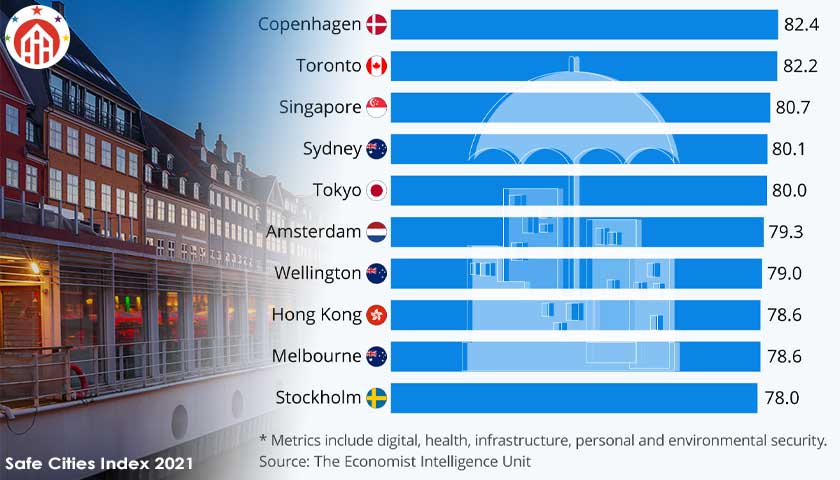The world’s safest cities 2021
The Safe Cities Index 2021 is a report from The Economist Intelligence Unit, sponsored by NEC Corporation. The report is based on the fourth iteration of the index, which ranks 60 cities across 76 indicators covering digital, health, infrastructure, personal and environmental security.
Copenhagen city capital of Denmark has secured the top position in the “safest city in the world” study conducted by the Economist Intelligence Unit (EIU).
The report is based on the fourth iteration of the index, which ranks 60 cities across 76 indicators covering digital, health, infrastructure, personal and environmental security.
Copenhagen has been named the world’s safest city in a new wide-reaching study from the Economist Intelligence Unit (EIU).
The Danish capital surpassed former frontrunners like Tokyo, Singapore and Osaka in the fourth edition of the EIU’s biennial Safe Cities Index, which for the first time included environmental security metrics.
In a study of five pillars of urban security — digital, health, infrastructure, personal and environmental — Copenhagen topped the charts, scoring 82.4 points out of 100.
The European city was followed closely behind by Toronto with 82.2 points. Singapore, Sydney and Tokyo, regular fixtures in the list’s top tiers, rounded out the top five.
Copenhagen city capital of Denmark has secured the top position in the “safest city in the world” study conducted by the Economist Intelligence Unit (EIU). Japan’s Tokyo city and Singapore have been knocked off first and second spots respectively in a ranking of the world’s safest cities by Copenhagen and Toronto after environmental security was added as a criterion in the ranking. Meanwhile, the coronavirus pandemic forced everyone to rethink what it means for a city to be safe.
The top 10 safest cities in the world in 2021:
1. Copenhagen, Denmark: 82.4/100 : Copenhagen has been named the world’s safest city in a new wide-reaching study from the Economist Intelligence Unit (EIU). Copenhagen scored 82.4 out of 100.
2. Toronto, Canada: 82.2/100 : Toronto, the capital of the province of Ontario secured the second position with a score of 82.2.
3. Singapore: 80.7/100 : The city slipped from its second-ranking to third with 80.7 to be one of the safest place amid the pandemic.
4. Sydney, Australia: 80.1/100 : Sydney, the capital of New South Wales and one of Australia’s largest cities is in the world’s top 10 safest cities list with 80.1 points out of 100.
5. Tokyo, Japan: 80.0/100 : The top scorer for the year 2019, Tokyo climbed down to the fifth position with 80.0 marks in the safest city 2021 list.
6. Amsterdam, the Netherlands: 79.3/100 : Netherlands’ capital Amsterdam is in the world’s top 10 safest cities list with 79.3 points out of 100.
7. Wellington, New Zealand: 79.0/100 : In the top 10 safest cities in the world list, New Zealand’s capital Wellington take the seventh spot with a score of 79.
8/9. Hong Kong: 78.6/100 : With 78.6 points, Hong Kong is the eighth safest city in the world.
8/9. Melbourne, Australia: 78.6/100 : Melbourne is the coastal capital of the southeastern Australian state of Victoria. Melbourne took the ninth spot with 78.6 points in the 2021 safest city list.
10. Stockholm, Sweden: 78.0/100 : Stockholm, the capital of Sweden made be in the top 10 list of safest cities in the world by scoring 78 points.
The EIU’s Safe Cities Index this year ranked 60 cities across 76 indicators of security, to get a better picture of global urban safety.
The addition of the new environmental security pillar reflects the increased importance of sustainability issues and climate adaptation measures following the coronavirus pandemic. Toronto and Copenhagen performed noticeably better in the new environmental security pillar than did any of the top-three cities from earlier years.
The experience of covid-19 shows the need for a more holistic approach to health security and its closer integration into urban resilience planning. It is still too early to draw detailed conclusions on the implications of covid-19 for health security. The pandemic continues at the time of writing. Even were it over, robust, internationally comparable data on what has happened are still rare. Nonetheless, the need to rethink health system preparedness is already clear. This must have several elements. The first is to look at different kinds of diseases and the wider determinants of disease as an interrelated whole rather than considering them in silos. The second is to think of populations as a whole, which will especially involve providing effective care for currently marginalised groups. The third is to integrate health emergency planning more fully into urban resilience measures that, often, have focused more on dealing with natural disasters and environmental concerns.




